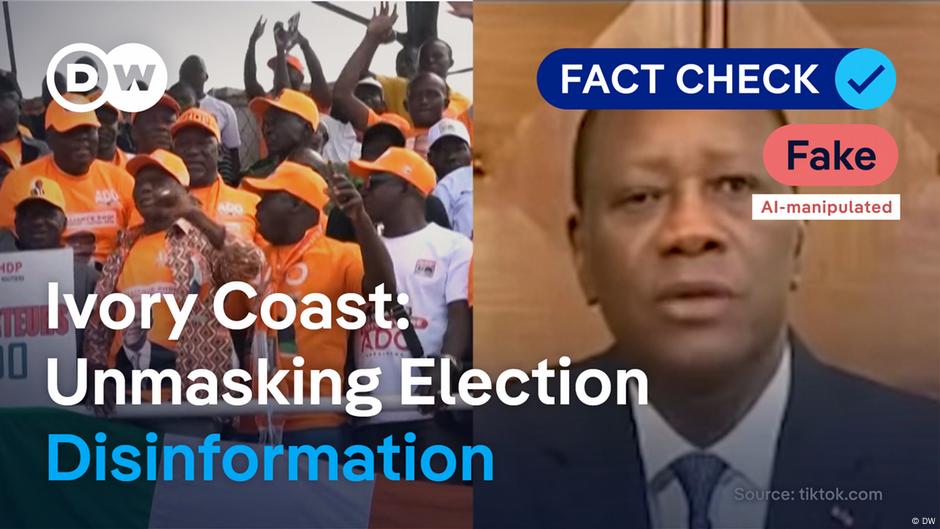Listen to the article
Disinformation Campaigns Intensify as Ivory Coast Approaches 2025 Presidential Election
False narratives are increasingly clouding Ivory Coast’s political landscape as the nation prepares for its 2025 presidential election. Social media platforms have become battlegrounds where fabricated stories circulate widely, threatening to undermine democratic processes in the West African economic powerhouse.
Among the most prominent falsehoods currently spreading are claims that President Alassane Ouattara plans to postpone his fourth term, allegations of secret communications between Ouattara and French President Emmanuel Macron, and accusations of electoral fraud schemes involving minors. Investigation reveals these narratives are entirely unfounded.
Political analysts monitoring the situation note that disinformation campaigns appear strategically designed to inflame existing tensions in Ivorian society, which has experienced periods of political violence in its recent history. The 2010-2011 post-election crisis, which resulted in approximately 3,000 deaths, remains fresh in national memory, making the spread of electoral misinformation particularly concerning.
“What we’re seeing isn’t random noise but calculated attempts to destabilize public confidence in electoral institutions,” says Dr. Marie Koné, a political science professor at Félix Houphouët-Boigny University in Abidjan. “When citizens cannot distinguish fact from fiction, democratic participation suffers.”
The disinformation phenomenon extends beyond domestic politics, intersecting with complex regional dynamics and international relations. False narratives frequently feature anti-French sentiment, playing into growing tensions regarding France’s influence in its former colonies across West Africa. Similar patterns have emerged in Mali, Burkina Faso, and Niger, where military governments have recently pivoted away from traditional French partnerships.
Ivory Coast, as the world’s largest cocoa producer and a significant regional economic hub, holds strategic importance that makes it a natural target for information warfare. With a GDP growth rate consistently above 6% in recent years, stability in the country has ramifications for commodity markets and regional security throughout West Africa.
Digital rights organizations have documented how these false claims spread through coordinated networks, often originating from accounts with suspicious patterns of activity. The narratives gain traction through repetition across multiple platforms, eventually reaching mainstream discourse where they can influence public opinion.
“We’ve identified several disinformation networks operating with sophisticated techniques,” explains Jean Bamba of Digital Rights Watch Côte d’Ivoire. “Some utilize authentic-looking but fabricated news sites, while others manipulate legitimate news content to create misleading narratives.”
Electoral authorities in Ivory Coast have launched awareness campaigns to combat the spread of false information, but face significant challenges in reaching voters across digital divides. Approximately 46% of Ivorians access the internet, primarily through mobile devices, creating a fragmented information landscape that complicates fact-checking efforts.
The Independent Electoral Commission has established a dedicated unit to monitor and respond to election-related disinformation, working alongside civil society organizations to promote media literacy. However, experts argue these measures may prove insufficient against well-funded disinformation operations.
International observers note that Ivory Coast’s experience reflects a troubling global trend of democratic processes increasingly vulnerable to digital manipulation. The European Union and African Union have both expressed concern about the potential impact of disinformation on electoral integrity across the continent.
“What’s happening in Ivory Coast isn’t isolated,” says political risk consultant Ibrahim Touré. “We’re witnessing similar patterns across Africa, where social media amplifies divisive narratives that exploit existing social fractures. The difference in Ivory Coast is the stakes involved given its economic importance and recent history of electoral violence.”
As the election approaches, fact-checking initiatives are intensifying efforts to debunk false claims before they take root in public consciousness. However, research shows corrections often struggle to reach the same audience exposed to the original misinformation.
The proliferation of these false narratives underscores the evolving challenges facing democratic institutions in the digital age, particularly in contexts where historical tensions can be easily exploited through sophisticated disinformation tactics.
Fact Checker
Verify the accuracy of this article using The Disinformation Commission analysis and real-time sources.




11 Comments
Disinformation campaigns targeting elections are a growing global problem. Social media platforms need to do more to identify and remove false narratives before they can spread widely. Fact-checking and public education will be crucial in the lead-up to the 2025 vote.
Absolutely. Strengthening democratic institutions and processes is the best defense against these kinds of malicious efforts to undermine elections.
The spread of disinformation is a global challenge, and the Ivory Coast is just the latest example. Protecting the integrity of elections must be a top priority for all democratic societies. I hope the authorities in the Ivory Coast can effectively counter these false narratives.
This is a worrying trend that undermines the democratic process. Fact-based, impartial reporting and public awareness campaigns will be crucial in the lead-up to the 2025 election. The international community should offer support and expertise to the Ivory Coast.
I agree, international cooperation and assistance could be invaluable in helping the Ivory Coast navigate this challenge.
Disinformation campaigns can have devastating consequences for a country’s stability and development. I hope the authorities in the Ivory Coast are taking proactive steps to identify and counter these false narratives before they gain further traction.
This is a concerning development that highlights the vulnerabilities of democratic systems in the digital age. Addressing disinformation will require a coordinated, multifaceted approach involving government, civil society, and tech companies.
Exactly. Protecting the integrity of elections should be a top priority for all stakeholders in the Ivory Coast.
This is concerning news about the spread of disinformation ahead of the Ivory Coast election. It’s critical that accurate, verified information reaches the public to safeguard the democratic process. Disinformation can have serious consequences, as we’ve seen in the past.
I agree, the potential for political violence is worrying. The authorities must act quickly to address the issue and ensure a free and fair election.
It’s disheartening to see the Ivory Coast facing this challenge. Free and fair elections are the bedrock of democracy, and any attempts to subvert the will of the people through disinformation must be swiftly condemned and countered.